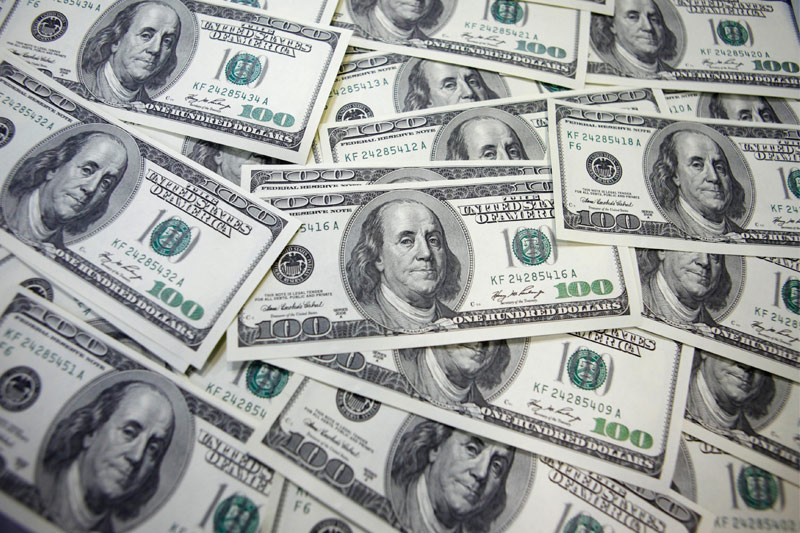Investing.com - The dollar weakened against the world's major global currencies on Monday on budding hopes U.S. policymakers will steer the economy away from a fast-approaching fiscal cliff.
Hopes Greece will see a fresh shot of bailout money also enticed investors out of the safety of the greenback.
In Asian trading on Monday, EUR/USD was up 0.22% at 1.2772.
On Tuesday, eurozone finance ministers will meet to discuss unlocking Greece’s next tranche of aid.
Expectations that European Union policymakers and the International Monetary Fund will disburse aid to crisis-weary Athens began to build early in the session and stoked demand for higher-yielding currencies, which came at the dollar's expense.
Hopes the U.S. will dodge an avoidable recession next year via policy weakened the dollar as well.
At the end of this year, the Bush-era tax cuts and other tax benefits expire at the same time pre-programmed cuts to government spending are scheduled to take effect, a combination known as a fiscal cliff that could send the country into recession next year if left unaddressed by Congress.
If untreated, the fiscal cliff could siphon over USD600 billion out of the U.S. economy next year alone in the form of rising taxes and cuts to government spending.
In the U.S. last Friday, Democratic and Republican congressional leaders met with President Barack Obama earlier to discuss ways to avoid the cliff, and both sides emerged afterwards expressing optimism for a deal, which continued to draw investors out of the safe-harbor dollar on Monday.
Meanwhile, the greenback was down against the pound, with GBP/USD trading up 0.21% at 1.5916.
The dollar was down against the yen, with USD/JPY trading down 0.10% at 81.24 and down against the Swiss franc, with USD/CHF trading down 0.17% at 0.9440.
The dollar was down against its cousins in Canada, Australia and New Zealand, with USD/CAD trading down 0.10% at 1.0002, AUD/USD up 0.31% at 1.0372 and NZD/USD trading up 0.09% at 0.8133.
The dollar index, which tracks the performance of the greenback versus a basket of six other major currencies, was down 0.19% at 81.11.
Later Monday, the U.S. is to release industry data on existing home sales, a leading indicator of economic health.
Hopes Greece will see a fresh shot of bailout money also enticed investors out of the safety of the greenback.
In Asian trading on Monday, EUR/USD was up 0.22% at 1.2772.
On Tuesday, eurozone finance ministers will meet to discuss unlocking Greece’s next tranche of aid.
Expectations that European Union policymakers and the International Monetary Fund will disburse aid to crisis-weary Athens began to build early in the session and stoked demand for higher-yielding currencies, which came at the dollar's expense.
Hopes the U.S. will dodge an avoidable recession next year via policy weakened the dollar as well.
At the end of this year, the Bush-era tax cuts and other tax benefits expire at the same time pre-programmed cuts to government spending are scheduled to take effect, a combination known as a fiscal cliff that could send the country into recession next year if left unaddressed by Congress.
If untreated, the fiscal cliff could siphon over USD600 billion out of the U.S. economy next year alone in the form of rising taxes and cuts to government spending.
In the U.S. last Friday, Democratic and Republican congressional leaders met with President Barack Obama earlier to discuss ways to avoid the cliff, and both sides emerged afterwards expressing optimism for a deal, which continued to draw investors out of the safe-harbor dollar on Monday.
Meanwhile, the greenback was down against the pound, with GBP/USD trading up 0.21% at 1.5916.
The dollar was down against the yen, with USD/JPY trading down 0.10% at 81.24 and down against the Swiss franc, with USD/CHF trading down 0.17% at 0.9440.
The dollar was down against its cousins in Canada, Australia and New Zealand, with USD/CAD trading down 0.10% at 1.0002, AUD/USD up 0.31% at 1.0372 and NZD/USD trading up 0.09% at 0.8133.
The dollar index, which tracks the performance of the greenback versus a basket of six other major currencies, was down 0.19% at 81.11.
Later Monday, the U.S. is to release industry data on existing home sales, a leading indicator of economic health.
